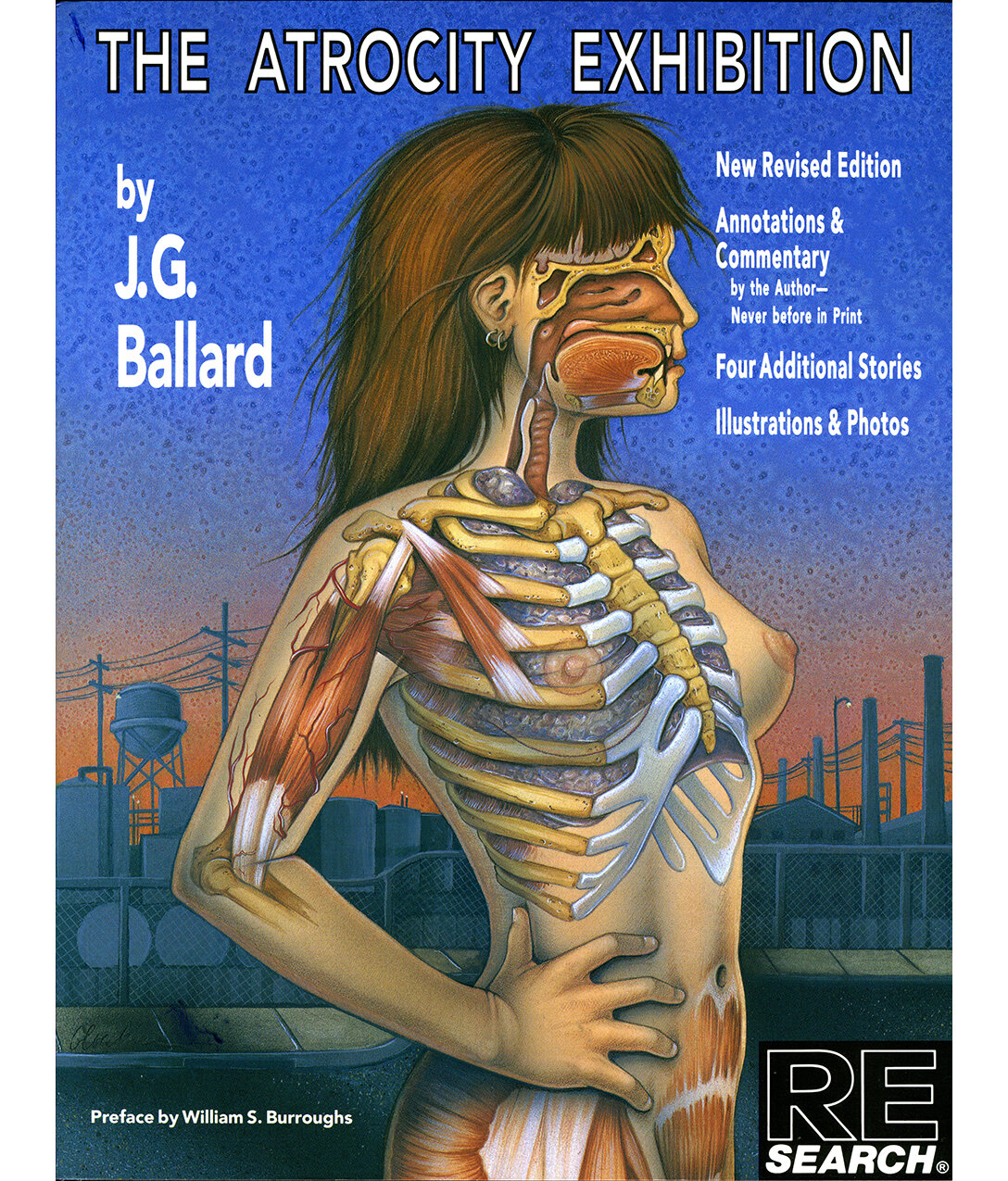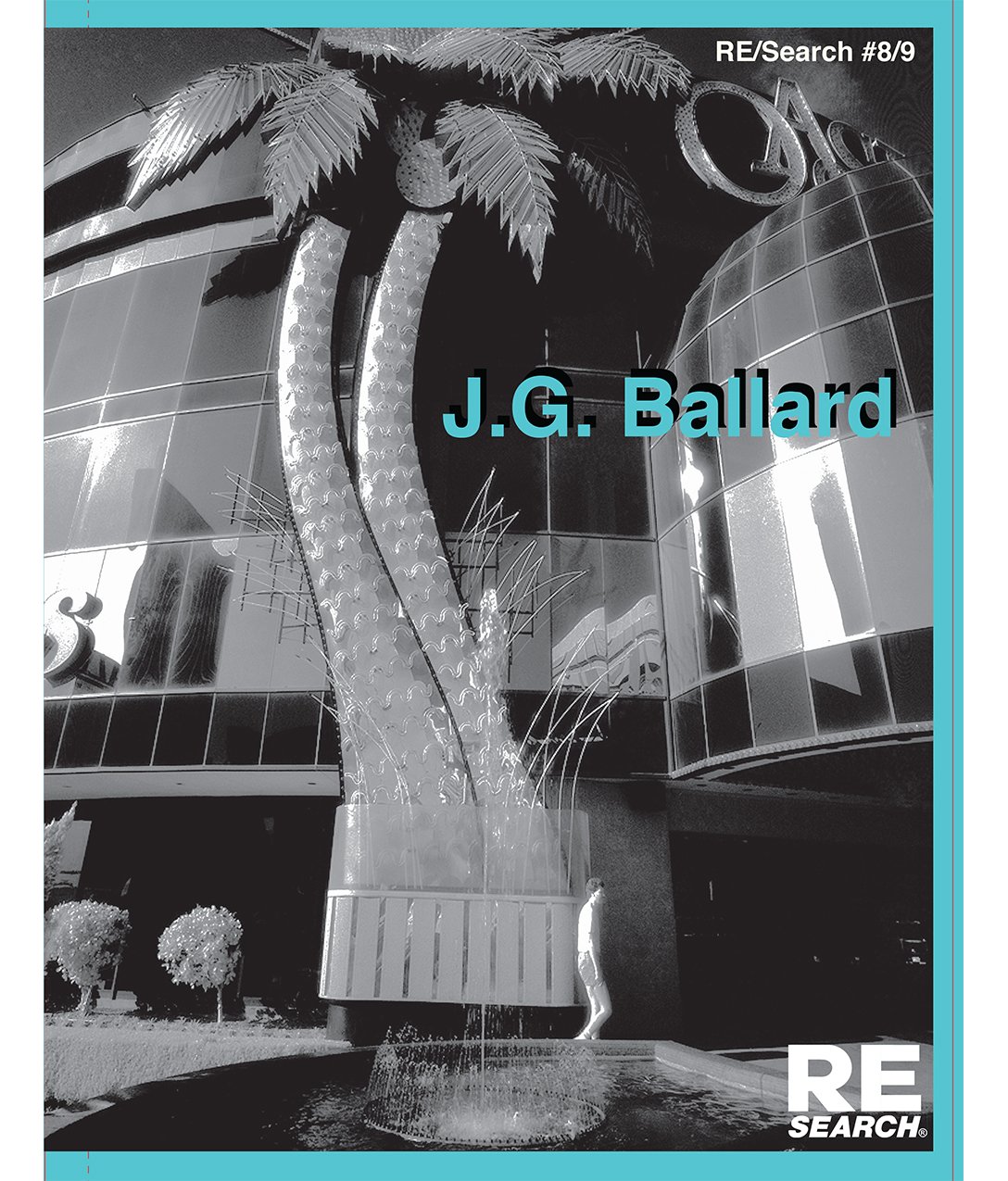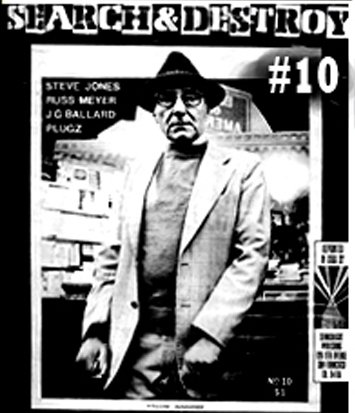Ballard’s books have remained fresh years after they were first published, and the provocations collected in J.G. Ballard: Quotes have worn well. Small enough to fit in a large pocket, this anthology brings together J. G. Ballard’s eye-opening thoughts on music, film, celebrity, the rise of corporate media, the death of reality, etc. Arranged by topics such as “Sex: Relationships, Sex times Technology equals the Future, Pornography” and “Surrealism, Imagination,” these quotes are clear, providing a strong beacon for readers accustomed to a baffling daily assault of advertisements, phone calls, and e-mails. They help readers better understand Ballard’s fiction—the most visionary, provocative literature of the 20th century. A Ballardian glossary, the essay “Guide to Virtual Death,” and a bibliography round out this essential resource. In today’s dense communications environment, where the average New Yorker experiences 14,000 branding messages each day one needs to continually make sense of a bafflingly complex, constantly changing environment. Brief, succinct quotes can quickly produce clarity amid moral murkiness—like a torch illuminating a dark forest ahead. This book is especially aimed at all who have to work for a living. It is our hope that many a commute may be glorified by this quotations book, which is easy to carry and use—just one minute at a bus stop may yield an inspiration sufficient to set one’s imagination reeling.
“I can’t resist dipping into it to find out what I think.” — J.G. Ballard
Excerpts:
Does the future still have a future?
The advanced societies of the future will not be governed by reason. They will be driven by irrationality, by competing systems of psychopathology.
People as a whole really aren’t interested in the future any longer.
Some people have suggested that mental illness is a kind of adaptation to the sort of circumstances that will arise in the future. As we move towards a more and more psychotic landscape, the psychotic traits are signs of a kind of Darwinian adaptation.
I can remember when people throughout the world were intensely interested in the future, and convinced that it would change their lives for the better. In the years after the Second World War, the future was the air that everyone breathed. Looking back, we can see that the blueprint of the world we inhabit today was then being drawn—television and the consumer society, computers, jet travel and the newest wonder drugs transformed our lives and gave us a powerful sense of what the 20th century could do for us once we freed ourselves from war and economic depression. In many ways, we all became Americans.
It was an excess of fantasy that killed the old United States, the whole Mickey Mouse and Marilyn thing, the most brilliant technologies devoted to trivia like instant cameras and space spectaculars that should have stayed in the pages of Science Fiction . . . some of the last Presidents of the U.S.A. seemed to have been recruited straight from Disneyland.
The future is probably going to be something like Las Vegas.
Whereas the 20th century was mediated through the car, the 21st century will be mediated through the home, and . . . home means work.
The ultimate crime-based society is one where everyone is criminal and no one is aware of the fact.
Our governments are preparing us for a future without work, and that includes the petty criminals . . . The psychopath, with his inward imagination, will thrive. He is already doing so.
Sadly, at some point in the 1960s our sense of the future seemed to atrophy and die. Overpopulation and the threat of nuclear war, environmentalist concerns for our ravaged planet and unease at an increasingly wayward science together made everyone fearful of the future.
Nobody is interested in the future at all. I think the future has been annexed into the present. Occasionally a futuristic image is trotted out, ransacked like an image of the past and absorbed into the ongoing continuum that represents present-day life.
One of the reasons we’ve turned our backs against the future at present is that we unconsciously sense that the logics that will dictate our lives in the next 20, 30, 40, 50 years will be completely unlike those which rule our lives today and have ruled our lives in the past. We may move into a very indeterminate, seemingly dangerous and chaotic era where all the old certainties and the social cement that held society together will have gone.
The Arab world, the Moslem world, may well take the place of the Communist world as the great bogeyman of the future.
A titanic battle is about to begin, a Darwinian struggle between competing psychopathies. Everything is for sale now, even the human soul has a barcode.
An institutionalized paranoia seems a bleak future for the human race.
We now live in the present, unconsciously uneasy at the future, and this short-term viewpoint does have dangers. We know that, as human beings, we are all deeply flawed and dangerous, but this self-knowledge can act as a brake on hope and idealism.
On the whole, people had shown less resourcefulness and flexibility, less foresight, than a wild bird or animal would. Their basic survival had been so dulled, so overlaid by mechanisms designed to serve secondary appetites, that they were totally unable to protect themselves. They were the helpless victims of a deep-rooted optimism about their right to survival, their dominance of the natural order which would guarantee them against everything but their own folly, that they had made gross assumptions about their own superiority.
These days one needed a full-scale emergency kit built into one’s brain, plus a crash course in disaster survival, real and imagined.
The superheroes of the future will be people who’ll challenge this condominium of boredom, and we’ll find that our Bonnies and Clydes will emerge to challenge the suburban values. [JGB News, 1993]
We’re driven by bizarre consumer trends, weird surges in the entertainment culture, mass paranoias about new diseases that are really religious eruptions. How to get a grip on all this? We may need to play on deep-rooted masochistic needs built into the human sense of hierarchy.
I’ve always suspected that the Soviet Union was the last of the old-style authoritarian tyrannies. The totalitarian systems of the future will be obsequious and subservient, plying us with drinks and soft slippers like a hostess on an airliner, adjusting our TV screen for us so that we won’t ask exactly where the plane is going, or even whether there is a pilot on board.
In a sense, we’re policing ourselves and that’s the ultimate police state, where people are terrified of challenge.
There is a deep underlying unease about the rate of social change, but little apparent change is actually taking place.
People realize that they’re living in a totally valueless world—that morality is coming to an end, in the sense that the moral institutions that have underpinned society and given it some sort of fleeting purpose are being dismantled.
We seem to be in the trough of a wave; there’s a huge wall rushing towards us with a white crest, and I just hope that we can ride to the top of it and maybe see something—a larger, more interesting world—on the other side. On the other hand, we may be swamped. We’re living in very interesting times but, at the same time, deeply uncertain ones.
How do you energize people, give them some sense of community?. . . [By] all activities that aren’t necessarily illegal, but provoke us and tap our need for strong emotion, quicken the nervous system and jump the synapses deadened by leisure and inaction.
It’s no coincidence that religious leaders emerge from the desert. Modern shopping malls have much the same function. A future Rimbaud, Van Gogh, or Adolf Hitler will emerge from their timeless wastes.
There are hints that a benign version of a Sadeian society is still emerging, of tormentors and willing victims.
You’ve got to set something like Crash against what I think of as the normalizing of the psychopathic—something that’s been happening for most of this century, but has really gathered force during the past 30 or 40 years, annexing more and more kinds of deviant behavior into the realm of the acceptable. Particularly in the sexual field, where people are now tolerant of sexual deviance in ways they weren’t in my parents’ generation.
People want to save the whale and the seal because they know that sooner or later the human being is probably going to be next on the list.
I think the main threat in the future is not to personal relationships, which will thrive despite easier divorce and the breakdown of the extended family, etc. I think the danger our children and grandchildren face lies in the decline and collapse of the public realm. Politics, the Church, the monarchy are all slowly sinking back into the swamp from which they rose in the first place. We stand on the shore, watching as they wave their rattles and shout their promises, while the ooze sucks at their feet. When the clamor at last subsides we will return to our suburbs, ready to obey the traffic lights and observe the civic codes that keep the streets safe for children and the elderly. But a small minority will soon be bored, and realize that in a totally sane society madness is the only freedom. So random acts of violence will break out in supermarkets and shopping malls where we pass our most contented hours. Surprisingly, we will deplore these meaningless crimes but feel energized by them.
Bourgeois life—in the sense of suburban norms—will be completely maintained. Yet at the same time there will be huge dislocations that will come from any quarter. They might be terrorist outrages that paralyze the motorway network of the whole of Western Europe. They might be social in the sense that some fanatical pressure group will man the barricades and disrupt ordinary life; or aesthetic—a decision to embrace a new kind of fashion. A preference for the color blue rather than the color red may have huge planetary consequences we can’t conceive of at the moment.
There were times in its history when the United States came close to suggesting what a utopian project might be, but the less appealing sides to American life now seem to be in the ascendant—there’s a self-infantilism strain that gives America the look of Peter Pan’s Never-never land. However, the future may well be a marriage between Microsoft and the Disney Company—an infantilized entertainment culture imposed on us by the most advanced communications technology.






